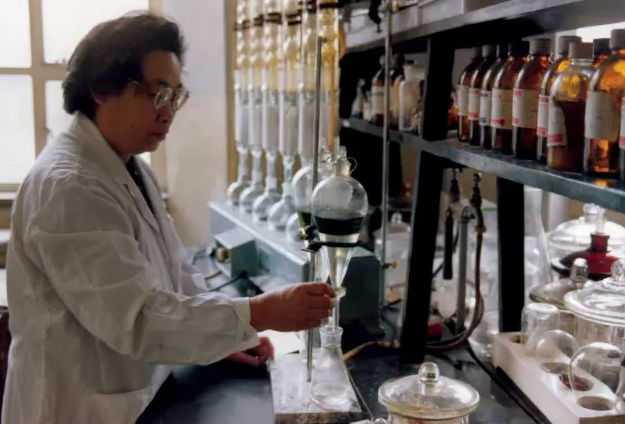


File photo of Tu Youyou carrying out her research on the efficacy of artemisinin in treating malaria.
A Chinese pharmaceutical company has announced its plan to invest 70 million yuan (about $10 million) in the research of the drug artemisinin as a potential treatment for lupus. The antimalarial drug, which was discovered by Chinese Nobel Prize laureate Tu Youyou, may offer novel and effective therapy against the disease.
According to an official announcement on Sept. 1, KPC Pharmaceuticals, Inc., a company based in southern China’s Yunnan province, plans to spend 70 million yuan on the purchase of a patent and clinical trial license for lupus treatment research. Lead by Tu, the research focuses on the efficacy of artemisinin in treating lupus. It is now in clinical trials.
“There is no drug tailored to treat lupus in China. Traditional therapy for the potentially fatal ailment is a combination of glucocorticoids and immunosuppressives, which can damage patients' immune systems in the long run,” KPC’s announcement read.
“If artemisinin can be proven to have better clinical efficacy in treating lupus, it may fill the vacuum in the pharmaceutical market, as there is currently no radical cure for the disease,” the report continued.
Lupus, or systemic lupus erythematosus, is an autoimmune disorder in which the body attacks its own tissue and organs, which can damage the joints, kidneys, heart, lungs, brain and blood.
Tu and her colleagues have been working on the treatment of autoimmune diseases with artemisinin for the past decade, with promising results for lupus. Her team received permission from the China Food and Drug Administration to carry out large-scale clinical testing in April, Xinhua reported.
 Shenzhen seizes 549 tons of illegally smuggled clothing
Shenzhen seizes 549 tons of illegally smuggled clothing Chinese actor Wang Baoqiang divorces wife, fires manager
Chinese actor Wang Baoqiang divorces wife, fires manager New hovercrafts debut in landing exercise
New hovercrafts debut in landing exercise Home-made plane completes test flight in Chicago
Home-made plane completes test flight in Chicago Huangluo: China's 'long hair village'
Huangluo: China's 'long hair village' Spectacular bridge with one of the tallest piers in the world
Spectacular bridge with one of the tallest piers in the world Magnificent view of Hukou Waterfall
Magnificent view of Hukou Waterfall Woman sets Guinness World Record with 17-month-long pregnancy
Woman sets Guinness World Record with 17-month-long pregnancy A glimpse of Stride 2016 Zhurihe B military drill
A glimpse of Stride 2016 Zhurihe B military drill Top 10 livable Chinese cities
Top 10 livable Chinese cities Top 20 hottest women in the world in 2014
Top 20 hottest women in the world in 2014 Top 10 hardest languages to learn
Top 10 hardest languages to learn China’s Top 10 Unique Bridges, Highways and Roads
China’s Top 10 Unique Bridges, Highways and Roads Australia’s security paranoia baffles China
Australia’s security paranoia baffles China
 Big love can come in small packages
Big love can come in small packages
 As traditional family lifestyle breaks down, more youngsters are living solo than ever before
As traditional family lifestyle breaks down, more youngsters are living solo than ever before
 Foreigners spice up Chinese instant noodle recipes with unique ingredients, concocting new and interesting flavor creations
Foreigners spice up Chinese instant noodle recipes with unique ingredients, concocting new and interesting flavor creations
Day|Week